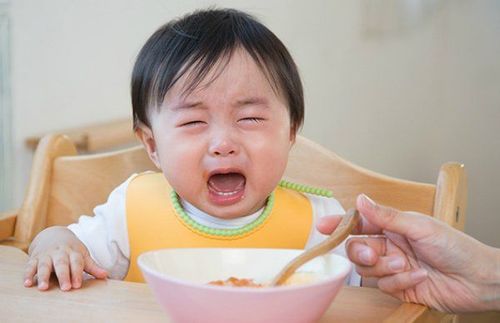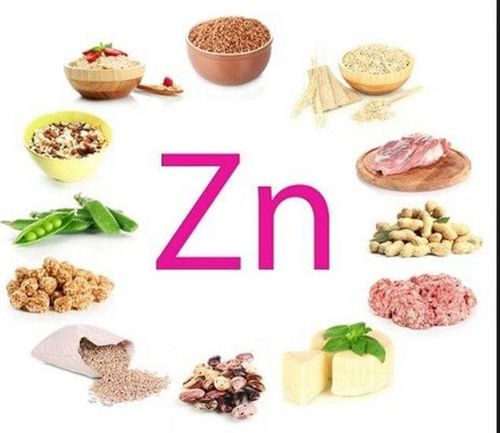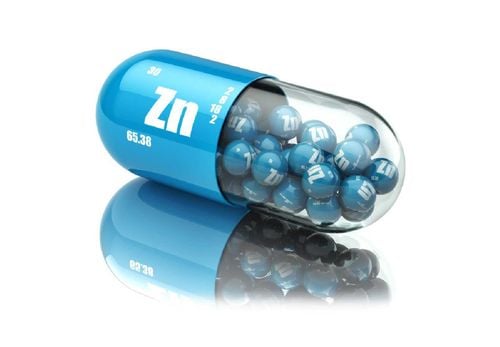This is an automatically translated article.
Zinc is an important micronutrient for the body, especially for children who are in a period of much physical and intellectual development. Therefore, children with zinc deficiency will affect growth and development such as stunting, malnutrition, retardation...
1. What role does zinc play in the development of children?
Zinc is an important micronutrient for the development of young children. Accordingly, zinc is a component in the active cycle of body enzymes, helping to divide cells, regulate taste, increase appetite when eating and strengthen the body's immune system.
Research from scientists shows that this micronutrient is involved in the structure of more than 300 enzymes in the body, plays an important role in the growth, reproduction of cells and the development of the system. Central neutral system.
2. What symptoms will children with zinc deficiency show?
Currently, zinc deficiency in children is a very common condition and is considered one of the public health problems. The results of studies show that about 62.3% of children aged 12 - 72 months are deficient in selenium; 51.9% of children aged 6 - 75 months are zinc deficient and 50 - 90% of children with prolonged malnutrition are zinc deficient. Although there is no accurate indicator of zinc deficiency and the body has no obvious symptoms, zinc deficiency will affect the development, growth and metabolism of the body.
Accordingly, children with zinc deficiency often have the following clinical signs:
Children with sleep disturbances are manifested by tossing and turning, having trouble sleeping or waking up startled and crying. The weakened immune system leads to slow wound healing, susceptibility to allergies and skin diseases such as dry skin, skin and mucosal lesions, acne, psoriasis, eczema.. Children often suffer loss of appetite, eat less, decreased sense of taste about food. Anemia, growth retardation, malnutrition, especially stunting.

Chán ăn là một trong những dấu hiệu nhận biết trẻ em bị thiếu kẽm
3. How will zinc deficiency affect the development of children?
3.1. Zinc deficiency makes children stunted and retarded Zinc is a micronutrient that helps the body increase protein absorption and synthesis, participates in cell division and regulates taste, helps increase appetite. Therefore, this micronutrient is very important for young children. Along with that, the need for zinc in children is much higher than in adults because of the growth rate and the body needs more zinc for metabolism and synthesis. Therefore, zinc-deficient children will be stunted and easily lead to malnutrition and growth retardation. Studies show that adequate zinc supplementation according to children's nutritional needs improves height in short and short children, weight gain in malnourished children.
3.2. Zinc deficiency in children easily leads to the risk of acute diarrhea and respiratory infections. The body's immune system works more effectively when the presence of zinc micronutrients. Therefore, the child's body will be susceptible to infections, increasing the risk of respiratory infections, acute diarrhea when zinc deficiency.
3.3. Mentally affected by zinc deficiency The influence of zinc on mental health is shown through the fact that zinc participates in the process of transporting calcium to the brain, calcium is a micronutrient that helps stabilize the body's nerves. Therefore, zinc deficiency will make children easily fussy, irritable...
3.4. Zinc deficiency makes children more susceptible to autism Research by scientists shows that there is a link between autism syndrome and zinc deficiency in children, especially young children. Accordingly, infants have higher zinc requirements for growth and development than older children, and zinc deficiency in early childhood may be related to autism syndrome.
4. How to give children zinc supplements? Children of different ages will have their own needs for zinc content to meet the growth and development of the body. Parents should take zinc supplements through appropriate nutrition, the improvement of symptoms can take place in a long time, so it is recommended that parents need to be calm and persistent when supplementing with nutrients for their children. either through food or functional foods. In particular, the use of functional foods should choose those of natural origin that are easily absorbed, do not use many types at the same time or continuously change the types of dietary supplements. For infants, breast milk is the most complete and safest source of zinc with the absorption rate of zinc from breast milk about 54%. Therefore, it is recommended that mothers should exclusively breastfeed their babies for the first 6 months of life and continue to maintain them until the child is 2 years old. Accordingly, the first month after birth, the amount of zinc in breast milk is the highest with about 2-3 mg/liter and decreases to 0.9 mg/l after the third month. The mother's diet needs to ensure adequate nutrients. Zinc-containing nutrition can provide enough for both mother and baby. In addition, children from 6 months of age onward, besides breast milk, need to supplement with zinc micronutrients for babies through the daily menu.

Trẻ em bị thiếu kẽm nên dùng sữa mẹ khi đang trong giai đoạn sơ sinh
Parents need to pay attention to some issues in supplementing children with zinc deficiency through nutrition as follows:
Nutrition for children should be ensured with a variety of foods in meals. That should have zinc-rich foods such as oysters, shrimp, fish, beef... Mothers should build healthy eating habits for zinc absorption in children such as using a lot of vitamin C-containing products (green vegetables). , vegetables, fruits) because the combination of vitamin C and zinc helps to increase the absorption efficiency of both ingredients. In addition to zinc micronutrients, mothers need to add necessary micronutrients for babies such as: Selenium, Chromium, Vitamins B1 and B6, Ginger, acerola fruit extract (vitamin C),... to improve taste, eat well, reach the correct height and weight, and exceed the standard, have a good immune system, strengthen the resistance to get sick less often and have fewer digestive problems. Parents should carry out prevention and treatment of diseases related to zinc deficiency such as prolonged bacterial infections, nephritis, diarrhea, pancreatitis, and intestinal parasites prevention.
5. Prevention of zinc deficiency in children
The dose of zinc deficiency prophylaxis for children corresponds to the physiological needs at each stage of the child's development. Accordingly, the need for zinc by age is as follows:
Children 7 months to 3 years old need 5mg of elemental zinc per day. Children 4-13 years old need 10mg of elemental zinc per day. Supplementing zinc through nutrition or through culture technology is guaranteed to be natural, easy to absorb and safe for the health of the baby, however, supplementing with zinc micronutrients for children with oral medications needs to be taken into consideration. prescribed by a pediatrician or a dietitian. Parents absolutely must not arbitrarily use zinc supplements for children.
In addition to zinc, parents also need to supplement their children with other important vitamins and minerals such as lysine, chromium, B vitamins,... errands. The improvement of symptoms can take place for a long time, so it is recommended that parents be calm and persistent when supplementing with nutrients for their children, either through food or functional foods. In particular, the use of functional foods should choose those of natural origin that are easily absorbed, do not allow simultaneous use of many types or continuously change the types of functional foods.
For more nutritional knowledge and child care for each age, parents should regularly visit the website vimec.com and make an appointment with the leading doctors, pediatric and nutrition experts of the National General Hospital. Vinmec when needing advice on children's health.













